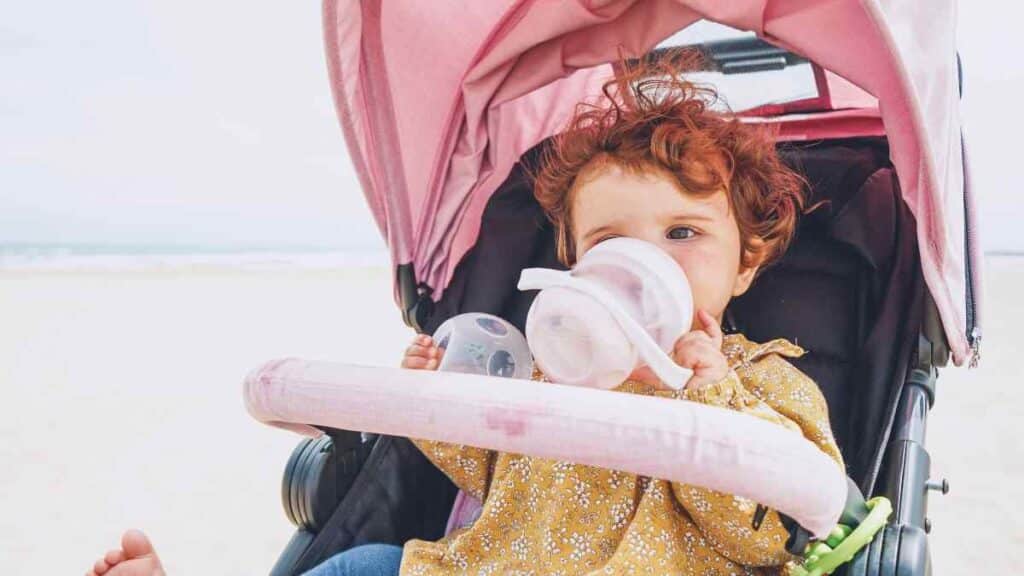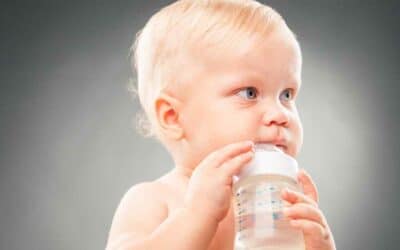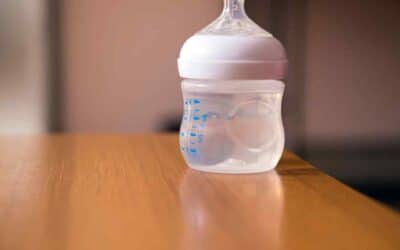
Until your baby reaches six months, they get their hydration requirements from either infant formula or breast milk. While not providing babies with water seems unnatural, studies show why infants should only be given water after six months. But how do you introduce safe drinking water for babies?
According to the World Health Organization, breastfed babies don’t need extra water, as the water content from breast milk contains almost 80 percent water, ensuring that babies remain hydrated until their bodies have developed.
This article discusses the best age for babies to drink water and a few pointers to remember when keeping your babies hydrated.
Understanding Babies’ Hydration Needs
According to Nemour’s Kid Health, breast milk or formula fully meets their hydration and nutritional needs for the initial six months of a baby’s life. Both provide the perfect balance of nutrients, including water, for healthy growth and development. This period is vital for establishing a solid foundation for a baby’s overall health.
- Breast Milk: It’s composed of about 88% water, supplying all the necessary hydration for a baby if fed on demand. Besides hydration, breast milk provides essential antibodies to help build the baby’s immune system.
- Formula: For those who formula-feed, it’s essential to mix the formula with an appropriate amount of water as instructed on the packaging. The correct ratio ensures that babies receive the necessary nutrients and hydration.
When to Introduce Water for Babies

According to experts, infants do not require additional water outside breast milk or formula for the first six months of life. These primary sources of nutrition adequately provide all the necessary hydration for infants during this early stage. The introduction of water should coincide with another significant dietary milestone: the initiation of solid foods.
- The 6-Month Milestone: It is generally recommended to begin introducing water to infants at about six months of age. This recommendation aligns with the typical age at which most babies are ready to start solid foods.
Choosing the Right Water for Your Baby
Tap Water: Pros and Cons
- Pros: Accessible, often enriched with fluoride to prevent tooth decay, cost-effective, and environmentally friendly.
- Cons: Quality varies by location; it may contain lead, nitrates, or bacteria.
- Safety Measures: Regular testing, especially in homes with old plumbing. Boiling kills bacteria, but not chemicals; filters are beneficial.
- When Suitable: Safe for babies over six months with proper precautions. It is recommended to boil for formula preparation.
Bottled Water: Types and Considerations
- Distilled Water: Boiled and condensed, removing impurities. Safe for formula but lacks fluoride.
- Purified Water: Treated to remove chemicals and pathogens. Safe but fluoride-free.
- Mineral Water: May contain high sodium or minerals; check labels.
- Usage: Convenient but costlier and less eco-friendly than tap. Check for sodium and fluoride levels.
Well Water: Use With Caution
- Safety Concerns: Possible bacteria, nitrates, and heavy metals contamination.
- Testing: Essential for well water users; local health departments can guide testing.
- Treatment: Filtration, UV purification, or reverse osmosis might be needed.
Baby Water: Designed for Infants
- Benefits: Baby water is free from harmful contaminants, sometimes with added fluoride. Ideal for formula.
- When to Use: Offers convenience and safety but is more expensive. It is not necessary if local water is safe.
Safety Tips and What to Avoid

Avoiding Excessive Water Intake
Water shouldn’t be given to babies under six months as they get enough hydration from breast milk or formula. Water intoxication can occur if they drink too much too soon, leading to symptoms like irritability and drowsiness. Once solid foods are introduced around six months, offer small sips of safe drinking water for babies gradually.
Contaminants to Watch Out For
- Lead: Found in older plumbing, it can affect development. Use cold water for cooking and drinking, and consider water testing.
- Nitrates: Present in well water, high levels can affect a baby’s oxygen flow. Test well water regularly.
- Fluoride: Aids tooth development in small amounts but can cause fluorosis if excessive. Use fluoride-free water for babies under six months and seek advice from a pediatrician.
Boiling Water for Babies
Boiling water kills bacteria and viruses but not chemicals like lead or nitrates. For infants under six months, use boiled water cooled to at least 70°C (158°F) for formula to ensure safety against bacteria in formula powder. For older babies, consult a healthcare provider for advice on using tap water.
Conclusion
Safe drinking water for babies is crucial for your baby’s health. Until six months, breast milk or formula should be their only source of hydration, a guideline backed by the World Health Organization to prevent water intoxication and ensure proper nutrition.
As you start solid foods, introducing water at six months is a key step. Choosing the right water type is essential, as well as ensuring it’s free from contaminants like lead, nitrates, and too much fluoride for your baby’s safety.
Test your water, use filters if needed, and consult healthcare professionals to make the best choices. Each baby’s needs differ, so when unsure, always consult a pediatrician for advice on your baby’s hydration and nutrition.
Do you have any other tips for other parents? Share the link and let’s start a conversation!



